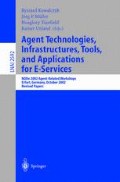Abstract
E-learning is nowadays recognized as one of the key components of Enterprise Knowledge Management platforms. Given a project specification, the platform should be able to suggest a project team, to measure human resources competence gaps and to contribute to reduce them by creating personalized learning paths. In this paper we propose an XML based Multi-Agent System to perform the following tasks: (i) supporting Chief Learning Officers in defining roles, associated competencies and knowledge level required; (ii) managing the skill map of the organization; (iii) measuring human resources competence gaps; (iv) supporting employees in filling their competence gaps as related to their roles; (v) enriching a given courseware or creating personalized learning paths according to feedbacks user provides in order to optimize the acquisition of needed competencies; (vi) assisting Chief Learning Offcers in choosing the most appropriate employee for a given role.
Access this chapter
Tax calculation will be finalised at checkout
Purchases are for personal use only
Preview
Unable to display preview. Download preview PDF.
References
Instructional Management System (IMS) Global Learning Consortium Specifications. [http://www.imsproject.org].
F. Soliman G. Duncan, R. Beckett. A comprehensive organizational model for Enterprise Knowledge Management. In Proc. of the 1st International Conference on Enterprise Information Systems, page 783, Setubal, Portugal, March 1999.
R.J. Glushko, J.M. Tenenbaum, and B. Meltzer. An XML framework for Agent-Based E-commerce. Communications of the ACM, 42(3):106–114, 1999.
H. Takeuci I. Nonaka. In The Knowledge Creating Company, New York, USA, 1995. Oxford University Press.
P. Kaipa. Design organizations that learn: An executive guide to learning. In Chinmaya Management Review, July 1998.
Y. Malhotra. Organizational learning and learning organizations: An overview. http://www.brint.com/papers/orglrng.htm.
D. E. O'Leary. Enterprise Knowledge Management. IEEE Computer Journal, 31(3):54–61, 1998.
G.A. Papadopoulos. Models and technologies for the coordination of Internet Agents: A survey. In Andrea Omicini, Franco Zambonelli, Matthias Klusch, and Robert Tolksdorf, editors, Coordination of Internet Agents: Models, Technologies, and Applications, chapter 2, pages 25–56. Springer-Verlag, March 2001.
A. Patel and Kinshuk. Adaptive educational environments for cognitive skills acquisition. In Proc. of International Conference on Advanced Learning Technology, pages 502–504, Madison, Wisconsin, USA, August 2001. IEEE Computer Society Press.
R. Lassleben R. Klimecki. What causes organizations to learn? In L. Araujo M. Easterby-Smith and J. Burgoyne, editors, Organizational Learning (Proceedings of the 3rd In-ternational Conference on Organizational Learning), volume 2, pages 551–577, Lancaster, England, June 1999.
T. Okamoto S. Belkada, A. I. Cristea. Measuring knowledge transfer skills by using constrained-student modeler autonomous agent. In Proc. of International Conference on Advanced Learning Technology, pages 375–378, Madison, Wisconsin, USA, August 2001. IEEE Computer Society Press.
A. Seffah and P. Grogono. Learner-centered software engineering education: From resources to skills and pedagogical patterns. In Proc. of 15th Conference on Software Engineering Education and Training, pages 14–21, Covington, Kentucky, USA, February 2002. IEEE Computer Society Press.
P. Stone and M. Veloso. Multiagent systems: A survey from a machine learning perspective. J. of Autonumous Robotics, 8(3):345–383, 2000.
J.M. Tenenbaum, T.S. Chowdhry, and K. Hughes. Eco system: An internet commerce architecture. IEEE Computer Journal, 30(5):48–55, 1997.
Author information
Authors and Affiliations
Editor information
Editors and Affiliations
Rights and permissions
Copyright information
© 2003 Springer-Verlag Berlin Heidelberg
About this paper
Cite this paper
Garro, A., Palopoli, L. (2003). An XML Multi-agent System for E-learning and Skill Management. In: Carbonell, J.G., Siekmann, J., Kowalczyk, R., Müller, J.P., Tianfield, H., Unland, R. (eds) Agent Technologies, Infrastructures, Tools, and Applications for E-Services. NODe 2002. Lecture Notes in Computer Science(), vol 2592. Springer, Berlin, Heidelberg. https://doi.org/10.1007/3-540-36559-1_21
Download citation
DOI: https://doi.org/10.1007/3-540-36559-1_21
Published:
Publisher Name: Springer, Berlin, Heidelberg
Print ISBN: 978-3-540-00742-5
Online ISBN: 978-3-540-36559-4
eBook Packages: Springer Book Archive

